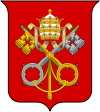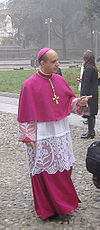- Pontifical Council for Promoting the New Evangelization
-

This article is part of a series on the
Roman CuriaApostolic Constitution Pastor Bonus
TribunalsAdministrative Services
WikiProjects- WikiProject Roman Curia
- WikiProject Catholicism
- WikiProject Vatican City
The Pontifical Council for Promoting the New Evangelization is a dicastery of the Roman Curia whose creation was announced by Pope Benedict XVI at vespers on 28 June 2010, eve of the Feast of Saints Peter and Paul. The Pope said that "the process of secularisation has produced a serious crisis of the sense of the Christian faith and role of the Church", and the new pontifical council would "promote a renewed evangelisation" in countries where the Church has long existed "but which are living a progressive secularisation of society and a sort of 'eclipse of the sense of God'." On 30 June 2010, Pope Benedict XVI appointed as its first President Archbishop Salvatore Fisichella, until then President of the Pontifical Academy for Life.[1] On May 13, 2011, His Holiness Pope Benedict XVI named Archbishop Jose Octavio Ruiz Arenas as the first Secretary of the Pontifical Council. Archbishop Ruiz Arenas had been serving as the Vice President of the Pontifical Commission for Latin America. The 66-year-old prelate is a native of Colombia. That same day, Monsignor Graham Bell, formerly the Secretary Coordinator of the Pontifical Academy for Life, was named the Undersecretary of the Pontifical Council.
Contents
Origin
The idea for a Council for the New Evangelisation was first floated by Father Luigi Giussani, founder of the Communion and Liberation movement, in the early 1980s, but was not taken up by Pope John Paul II. More recently, Cardinal Angelo Scola of Venice presented the idea to Benedict XVI.[2]
The term "new evangelisation" was popularised by Pope John Paul II with reference to efforts to reawaken the faith in traditionally Christian parts of the world, particularly Europe, first "evangelised", or converted to Christianity, many centuries earlier, but then standing in need of a "new evangelisation".
Establishment
Pope Benedict XVI established the Council with Art. 1 §1 of the motu proprio Ubicumque et semper', given from Castel Gandolfo 21 September 2010[3] and published in the L'Osservatore Romano[4] 12 October 2010.
The incipit of the document is part of the phrase: "The Church has a duty everywhere and at all times to proclaim the Gospel of Jesus Christ". Pope Benedict quoted Pope Paul VI who stated that the work of evangelisation "proves equally increasingly necessary because of the frequent situations of de-Christianization of our days, for multitudes of people who have been baptized but who live quite outside of Christian life, for simple people who have a certain faith, but he knows the basics wrong, for intellectuals who feel the need to know Jesus Christ in a different light from the teaching they received as children, and for many others "[5].
The document lists the specific tasks of the Council which include:
- deepen the theological and pastoral significance of the new evangelisation;
- promote and encourage, in close collaboration with the Episcopal Conferences concerned, that can have an ad hoc body, study, dissemination and implementation of the papal magisterium on matters related to the new evangelisation;
- raise awareness and support activities related to the new evangelisation which are being applied in various particular Churches and to promote the realisation of new, actively involving the resources of the Institutes of Consecrated Life and Societies of Apostolic Life, as well as in associations of the faithful and new community;
- study and promote the use of modern forms of communication, as tools for the new evangelisation;
- promote the use of the Catechism of the Catholic Church as an essential and comprehensive formulation of the content of faith to the people of our time.
Presenting the new Council to the press, Archbishop Fisichella said: "The Gospel is not a myth, but the living witness of an historical event that changed the face of history." He added: “The new evangelization first and foremost makes known the historical person of Jesus, and his teachings as they have been faithfully transmitted by the original community, teachings that find in the Gospels and in the writings of the New Testament their normative expression."[6]
Hierarchy of the Council
President:
- Salvatore Fisichella (30 June 2010 – present)[7]
Secretary:
- José Ruiz Arenas (13 May 2011 – present)[8]
Undersecretary:
- Mgsr. Graham Bell (13 May 2011 - present)[9]
Members of the Council
Council members participate in the discussions of the council and attend yearly plenary meetings in Rome. They serve five year terms renewable until their 80th birthday.
- Gianfranco Cardinal Ravasi (29 December 2010 -)
- Archbishop Timothy M. Dolan (5 January 2011-)[10]
- George Cardinal Pell (5 January 2011-)[10]
- Marc Cardinal Ouellet (5 January 2011-)[10]
- William Cardinal Levada (5 January 2011-)[10]
- Archbishop Andre-Joseph Leonard (5 January 2011-)[10]
- Archbishop Claudio Celli (5 January 2011-)[10]
- Archbishop Nikola Eterovic (5 January 2011-)[10]
- Archbishop Bernard Longley (5 January 2011-)[11]
- Christoph Cardinal Schönborn (5 January 2011-)[11]
- Angelo Cardinal Scola (5 January 2011-)[11]
- Josip Bozanic (5 January 2011-)[11]
- Francisco Cardinal Robles Ortega (5 January 2011-)[11]
- Odilo Pedro Cardinal Scherer (5 January 2011-)[11]
- Stanisław Cardinal Ryłko (5 January 2011-)[11]
- Archbishop Claudio Maria Celli (5 January 2011-)[11]
- Nikola Eterovic (5 January 2011-)[11]
- Pierre-Marie Carré (5 January 2011-)[11]
- Robert Zollitsch (5 January 2011-)[11]
- Bruno Forte (5 January 2011-)[11]
- Adolfo González Montes (5 January 2011-)[11]
- Vincenzo Paglia (5 January 2011-)[11]
References
- ^ Press Office of the Holy See
- ^ Report: Pope to launch 'Pontifical Council for New Evangelization', re-accessed 14 Jan 2011
- ^ Motu Proprio Ubicumque et Semper, Art. 4
- ^ Motu Proprio Ubicumque et Semper, Art. 4
- ^ Ap. Exhort. Evangelii Nuntiandi, 52
- ^ Pope Benedict XVI Creates Pontifical Council for New Evangelization
- ^ National Catholic Register editorial, 7 November 2010
- ^ "Rinunce e Nomine 13.05.2011" (in Italian). Holy See Press Office. 2011-05-13. http://press.catholica.va/news_services/bulletin/news/27411.php?index=27411&po_date=13.05.2011&lang=ge. Retrieved 2011-05-14.
- ^ http://www.gcatholic.com/hierarchy/data/officials-1.htm#47004
- ^ a b c d e f g NC Register.com, accessed Jan 10 2011
- ^ a b c d e f g h i j k l m n "Nomina di Membri del Pontificio Consiglio per la Promozione della Nuovo Evangelizzazione" (in Italian). Holy See Press Office. http://press.catholica.va/news_services/bulletin/news/26652.php?index=26652&lang=en#NOMINA_DI_MEMBRI_DEL_PONTIFICIO_CONSIGLIO_PER_LA_PROMOZIONE_DELLA_NUOVA_EVANGELIZZAZIONE. Retrieved 2011-01-14.
Categories:- Roman Curia
- Pontifical Councils
- Religious organizations established in 2010
- Pope Benedict XVI
Wikimedia Foundation. 2010.

